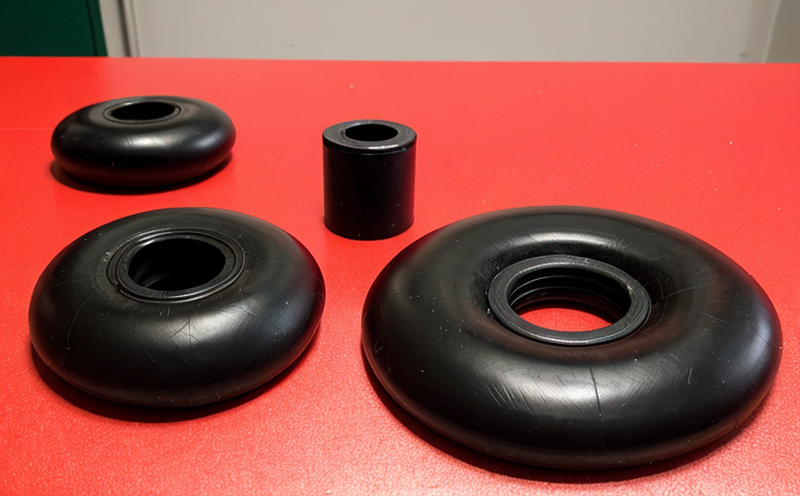JIS K 6262 Heat Resistance Testing of Rubber
The JIS K 6262 heat resistance testing method is a critical standard used in the manufacturing and quality assurance processes for rubber and elastomers. This test evaluates how well a rubber material can withstand high temperatures without degrading or losing its mechanical properties. This service ensures that materials meet stringent performance requirements, which is essential for industries such as automotive, construction, and aerospace.
The JIS K 6262 method is widely recognized in Japan and internationally due to its rigorous approach to evaluating the thermal stability of rubber compounds. The test involves exposing a carefully prepared sample to an elevated temperature for a specified period under controlled conditions. Upon completion of the heat treatment, the sample undergoes detailed examination to assess any changes in physical properties such as tensile strength, elongation at break, and hardness.
The importance of this testing cannot be overstated, especially in critical applications where rubber components must remain functional under extreme temperature conditions. For instance, in automotive tires, ensuring that rubber can withstand high temperatures during long drives is crucial for safety and performance. Similarly, in the construction industry, rubber seals need to maintain their integrity even when exposed to harsh weather conditions.
To perform JIS K 6262 testing accurately, the sample must be prepared following strict guidelines outlined in the standard. This includes selecting an appropriate sample size based on the specific application and ensuring that it is cut to a uniform shape for consistent results. The test apparatus used in this procedure typically consists of a heated chamber capable of maintaining precise temperature control.
The heat resistance test involves placing the prepared sample into the heating chamber, which is then brought up to the specified temperature range over a short period and maintained there for a set duration. After cooling down, the sample undergoes a series of mechanical tests to determine if it has retained its original properties. These tests include measuring tensile strength, elongation at break, hardness, and other relevant parameters.
Our laboratory adheres strictly to JIS K 6262 standards throughout this process, ensuring that every step is conducted with precision and accuracy. This level of adherence guarantees reliable results that can be trusted by manufacturers and quality assurance teams worldwide. By leveraging our expertise in polymer and plastics testing, we provide clients with comprehensive reports detailing the performance characteristics of their rubber compounds under heat stress.
Understanding the nuances of this test allows us to better serve industries relying on high-performance rubber materials. With an ever-growing emphasis on sustainability and durability, understanding how different rubber types behave at elevated temperatures becomes increasingly important. Our commitment to providing accurate JIS K 6262 results helps ensure that products meet stringent quality standards while also contributing positively towards environmental goals.
Scope and Methodology
The following table outlines the scope of our JIS K 6262 heat resistance testing service:
| Test Parameter | Description |
|---|---|
| Temperature Range | 100°C to 300°C, depending on the application and material type. |
| Time Duration | From 2 hours to 7 days, again dependent upon specific requirements. |
| Trial Samples | A minimum of three samples per batch are tested for consistency. |
The methodology involves several key steps:
- Sample preparation according to JIS K 6262 guidelines.
- Heating the sample in a controlled environment at specified temperatures.
- Maintaining the temperature for the required duration.
- Cooling down the samples after the test period ends.
- Conducting post-test mechanical property assessments.
The results from these tests provide valuable insights into the thermal stability of rubber materials, enabling manufacturers to make informed decisions regarding material selection and process optimization. Our laboratory employs state-of-the-art equipment capable of delivering precise and repeatable test outcomes that meet or exceed industry expectations.
Environmental and Sustainability Contributions
The results from JIS K 6262 heat resistance testing play a vital role in promoting sustainability within various industries. By ensuring that rubber materials can withstand extreme temperatures without compromising their structural integrity, we contribute to the development of more durable products.
Incorporating sustainable practices into product design and manufacturing processes has become increasingly important as companies seek ways to reduce waste and improve resource efficiency. Our testing service supports these efforts by providing data that helps identify optimal material choices for specific applications. For example:
- Automotive manufacturers can use this information to create tires with improved heat resistance, extending vehicle performance in hot climates.
- Construction firms benefit from knowing which rubber compounds will perform best under extreme weather conditions, reducing the need for frequent replacements and maintenance.
By leveraging our expertise in polymer and plastics testing, we offer a valuable resource for companies looking to enhance their environmental footprint through informed decision-making. Our commitment to accuracy and precision ensures that clients receive reliable results they can trust when selecting materials for challenging applications.
Competitive Advantage and Market Impact
Performing JIS K 6262 heat resistance testing offers significant competitive advantages in the market by ensuring product reliability under harsh conditions. This service enables manufacturers to:
- Demonstrate compliance with international standards.
- Ensure consistent quality across batches of production.
- Promote trust among customers who value robust performance from their suppliers.
In addition, our testing provides valuable data that can be used to refine manufacturing processes and improve product design. This leads to enhanced competitiveness in the marketplace as companies gain a deeper understanding of how different rubber compounds behave under heat stress.
Our laboratory's proficiency in this area positions us as leaders in providing reliable testing services for quality managers, compliance officers, R&D engineers, and procurement professionals. By offering accurate JIS K 6262 results, we help these stakeholders make informed decisions that contribute to overall business success.





